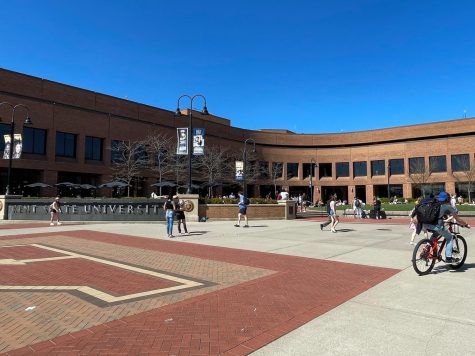Finding the way home
August 24, 2005
Communication and involvement are key to adjusting to college life
Credit: Beth Rankin
It was the second day of class for freshman Heather Treer. Things had been going well her first week on campus. Orientation was fine. Her roommate was fine. English class was fine.
But when she got on the phone with her mom, she lost it.
“I was talking to my mom at night, and I just started freaking out,” said Treer, now a sophomore early education major. “I don’t know what came over me.”
Treer’s mother was supportive but realistic.
“She was like, ‘You know, you have to get used to it,’” Treer said.
Homesickness is something many freshmen face, and how far students are from home or who they leave behind can have very little to do with how homesick a student will be.
“The people I’ve seen that are really homesick live as little as an hour away,” said Dr. Jason Miller, clinic director at the Counseling and Human Development Center in White Hall.
Some miss their boyfriends or girlfriends. Some miss their moms and dads. Others just miss their beds.
Growing up, moving out
Students living on their own for the first time must make adjustments, Miller said. There’s no longer anyone to tell them when to go to bed, when to get up or when to eat.
“Sometimes, people wish they had some type of structure,” he said.
Miller’s office gets especially busy first semester around mid-terms and just before spring break in second semester, he said. Students are feeling stressed and homesick, and college is no longer new.
“One factor just compounds everything else,” he said.
Amy Quillin, associate director of Resident Services, said that homesickness shows up in many ways.
“I don’t know that there’s sort of a list that fits all,” she said, but significant changes in behavior such as drinking excessively, withdrawal, missing classes or going home often are signs that a student is struggling with the adjustment to college life.
Although senior nursing major Emily Tonsky roomed with her best friend from home during her freshman year, she found herself struggling to adjust. On weekends when she didn’t go home, Tonsky, who is from Canton, said she partied to cope with her homesickness.
“What’s easy to do when you feel that way is to isolate yourself or engage in behaviors to numb yourself,” Quillin said.
Strike a balance
Heather Treer cried every night during the first week of classes. The excitement and freedom she’d felt during orientation week had faded, and reality set in.
“I realized how hard it was going to be,” she said.
But that weekend, Treer stayed on campus instead of making the 45-minute drive to her home in Lyndhurst.
Quillin likes to see students stay on campus during weekends.
“If you go home the first couple weekends,” Quillin said, “then that sort of sets the pattern you’re more likely to follow, as opposed to staying here on weekends and recognizing that, ‘Wow, there’s stuff to do on the weekends.’ ”
Tonsky found herself going home weekend after weekend to spend time with her boyfriend. Once she broke up with him, staying on campus during weekends and getting into the college scene became easier, she said.
But not going home doesn’t mean cutting all communication.
Miller suggests maintaining close contact with family and friends from home — not just calling every week or two.
“More times than not, if they do keep some kind of contact, it can help,” he said.
Miller also suggests building a strong support system on campus — developing friendships and getting involved in on- and off-campus activities.
Quillin agreed, pointing out that Kent has more than 250 student organizations, covering interests from politics to martial arts.
“If you don’t find what you’re looking for, you can start it,” Quillin said.
Help is just around the corner — literally
There’s a good reason that first-year halls have a higher ratio of staff to students than other halls, Quillin said.
“Staff can be more intentional about addressing those issues with students and being aware of what’s going on,” she said.
Resident Assistants address the issue of adjusting to college life through special programs, bulletin boards and fliers, she said.
For students who want counseling, several offices on campus offer services for free.
The Counseling and Human Development Center, in 325 White Hall, deals with everything from homesickness and roommate issues to severe depression. Services are also available at the Psychological Clinic in 303 Kent Hall.
A new home
Sometimes, Miller said, one semester is not enough time to adjust. Students just have to wait it out.
During her first semester, Heather Treer said she went home about every other weekend to wait tables at the Mayfield Heights restaurant she’d worked at in high school. That was a drawback, she said.
“It was an escape for me, knowing I had my car, knowing I could go home,” Heather said. “It made it harder.”
By second semester, Treer had cut back on her shifts and was staying on campus more frequently. She was bonding with her roommate, who she’s going to live with again during her sophomore year, and several other girls from her hall.
And just as she’d cried when she arrived in the fall, Treer found herself in tears once again in the spring, when it was time to leave.
“It was so hard to leave my friends at the end of the year. We all bawled our eyes out,” Treer said.
This fall, she can’t wait to come back. She’ll be reunited with the friends she’s made, and she won’t be working any shifts at a restaurant 45 minutes away.
When she returns to campus, Heather Treer will be right where she wants to be.
She’ll be home.
Contact copyeditor Jill Strainic at [email protected].
























